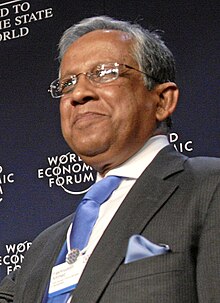Fakhruddin Ahmed
Fakhruddin Ahmed | |
|---|---|
| ফখরুদ্দীন আহমেদ | |
 Ahmed at the World Economic Forum (2008) | |
| Chief Advisor of Caretaker government of Bangladesh | |
| In office 12 January 2007 – 6 January 2009 | |
| President | Iajuddin Ahmed |
| Preceded by | Fazlul Haque (Acting) |
| Succeeded by | Sheikh Hasina |
| Governor of Bangladesh Bank | |
| In office October 2001 – April 2005 | |
| President | Iajuddin Ahmed |
| Preceded by | Mohammed Farashuddin |
| Succeeded by | Salehuddin Ahmed |
| Personal details | |
| Born | 1 May 1940 Munshiganj, Bengal Presidency, British India (now in Bangladesh) |
| Nationality | British Indian (1940–1947) Pakistani (1947–1971) Bangladeshi (1971–present) |
| Political party | Independent |
| Alma mater | Williams College University of Dhaka K.M. Latif Institution, Pirojpur Princeton University (Ph.D.) |
Fakhruddin Ahmed (born 1 May 1940) is a Bangladeshi economist, civil servant, and a former governor of the Bangladesh Bank, the country's central bank.[1]
On 12 January 2007, he was appointed as the Chief Adviser (Head of the Government) of the non-party interim caretaker government of Bangladesh, amidst Bangladeshi political crisis in 2006. He continued in that post for nearly two years, a longer than usual time, but new elections were held in 29 December 2008, and the Awami League assumed power based on its majority.
Early life and career
Ahmed was born on 1 May 1940 in Munshiganj to Mohiuddin Ahmed. He studied economics at Dhaka University, where he obtained his BA (Hons) and MA in 1960 and 1961, respectively, standing first in his class both times.[2] He earned a master's degree in development economics from Williams College and a Ph.D. in economics from Princeton University in 1975. His doctoral dissertation was titled "Migration and employment in a multisector model; an application to Bangladesh."[3]
Ahmed started his career as a lecturer of economics in Dhaka University. Later, he joined the civil service of Pakistan. After the Bangladesh Liberation War, he served the civil service of Bangladesh until 1978.
That year, he joined the World Bank, where he held various mid-level positions. On retirement from the World Bank, he took the post of Governor of the Central Bank of Bangladesh (Bangladesh Bank) on 29 November 2001. His contract expired on 30 April 2005.
He then became Managing Director of the Palli Karma-Sahayak Foundation (PKSF), the country's apex micro-finance organisation, beginning on 1 June 2005.[4]
2007 interim caretaker government

On 12 January 2007, President Iajuddin Ahmed swore him in as Chief Adviser to the Interim Caretaker Government, after the former interim government under the President was dissolved. Fakhruddin Ahmed is credited with bringing an end to the anarchy that had threatened to sweep the troubled nation. In a country widely perceived as one of the world's most corrupt, Ahmed stressed an anti-graft campaign against the establishment during his tenure.
More than 160 senior politicians, top civil servants, and security officials were arrested on charges of graft and other economic crimes.[5] Included were former ministers from the two main political parties, the Awami League and the Bangladesh National Party, including former prime ministers Sheikh Hasina and Khaleda Zia, and the former acting prime minister Fazlul Haque.
Ahmed fainted while giving a speech at a tree-planting event on 3 June 2007, apparently due to the heat, and was hospitalized.[6][7] He was released from the hospital later the same day and has said that he was well.[8]
Following the elections in 2008, a new parliament was formed. On 6 January 2009, the interim government made way for an elected Awami League government, which had won a two-thirds majority.
Ahmed has since retired from the public sphere and is now living in the United States.
References
- ^ "Fakhruddin Ahmed | The Asian Age Online, Bangladesh". The Asian Age. Retrieved 9 August 2019.
- ^ "Fakhruddin takes oath as new Chief Adviser" Archived 13 January 2012 at the Wayback Machine, The New Nation, 12 January 2007, Retrieved on 12 January 2007 UTC
- ^ Ahmed, Fakhruddin (1975). Migration and employment in a multisector model; an application to Bangladesh.
- ^ Liton, Shakhawat (13 January 2007). "Fakhruddin new CA". The Daily Star. Retrieved 12 January 2007.
- ^ "Corruption has emerged as a great threat". Time. 22 March 2007.
- ^ Ahmed, Parveen (3 June 2007). "Report: Bangladeshi Leader Faints". The Washington Post. Associated Press.
- ^ "Bangladesh interim head collapses". BBC News. 3 June 2007.
- ^ "Head of Bangladesh's caretaker government leaves hospital", Xinhua (People's Daily Online), 4 June 2007.


